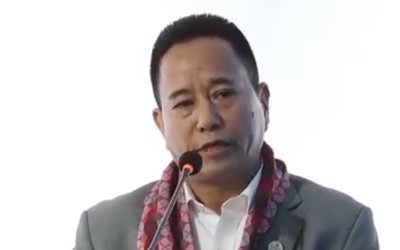More on News





Five individuals who also happen to be the judges of the Supreme Court (that included the Chief Justice) were invited by the dispute resolution committee consisting of leaders from four major political groups. Madhav Kumar Nepal, a former Prime Minister and the leaders of the Communist Party of Nepal-Unified Marxist Leninist (CPN-UML) vented his ire: judiciary needs to purify itself. He also said that judiciary has not cooperated when he, as the Prime Minister, tried to begin the road expansion in the capital. In a way, he set the tone for 'lenden' (give and take) with the judges.
The judges attending the summon of the political committee will bring the judiciary to public for many days to come, if not months and years. There are far more important issues that need to be clarified here. One, the five judges who went there were there purely on their individual capacities. They may have put forward many important and right issues, but that should be taken purely as their individual views, and in no way, the viewpoint of the Supreme Court as an institution.
The judges apparently tried to plead their cases on bended knees: that the Supreme Court's role was no less prominent in having democracy restored almost parallel to the people’s movement of 2006 as it had, among other things, dismissed the Royal Commission set up by the King's regime to try 'corruption cases' against some leaders including former Prime Minister Sher Bahadur Deuba. No doubt, it was a laudable verdict by a full bench of the Supreme Court headed by Anup Raj Sharma. It is also a very clear case that the Supreme Court was free and independent even during that regime, something that cannot be said about post 2006 April situation. For the judges to point out a judgment delivered by a bench in the past as a poof of their commitment to democracy, and beg on that basis the 'indepdence' of judiciary in the future constitution only betrays lack of confidence and conviction on these core values.
Independence of judiciary is an integral and inseparable part of a constitution along with full respect to the principle of separation of powers. Baburam Bhattarai and Prachanda are the ones who have been advocating for doing away with the principle of separation of powers and independence of judiciary. They wanted a committed and captive judiciary that would be accountable to the legislature. They have not given up on that.
Soon after the 2006 April movement, the judges in the Supreme Court were asked to take fresh oath on the basis of a provision in the interim constitution.The judges society is not asserting that the judges should not be asked to take oath once again when the new constitution is promulgated. But failure on the part of the judges then to resist -fresh oath- would land them in trouble no matter what the five judges may have told before the political committee. If they can take oath because there was a provision inserted in the interim constitution, how will they resist it if a 'full fledged constitution to be prepared by the Constituent Assembly has that provision? A compromise made by the judges then will prove to be a slur on the independence of judiciary forever in the future.
No doubt, the judges told the committee that having a separate constitutional court was undesirable and that the independence of judiciary--that is also linked with the issue of appointment of judges --should be maintained at any cost. True, setting up of a separate constitutional court will reduce the Supreme Court to an extension of the executive, something Maoists would want to pursue very seriously.But independence of the judiciary is not something a political committee would be able to fathom. Not too long ago, had Prachanda said that he recognised only the 'people's court' and not the Supreme Court. Incidentally, his comment had come in connection with the Supreme Court's verdict that the Constituent Assembly will stand dissolved even if it failed to have the constitution delivered by May 27 (2012). It may not have been a coincidence that the summon to the judges was issued a day before it was to deliver its judgment on the maintainability of review petition on its last verdict on the tenure of the House. Judges being independent and conscientious should not be enough, they should be seen as being one. After all, when we talk about independence of judiciary, it means independence and freedom of the judiciary as an institution, and that of individual judges. And going by what Madhav Nepal said on the occasion was not charitable either.
The fact that the committee has not called any other legal luminaries to discuss the 'future judiciary' and only senior judges of the Supreme Court merits criticism. As the CA is out to curtail the process of interacting with the people and stakeholders, it merely performed a formality. But there are ominous signs that judiciary would not be as independent and free as it was under the 1990 constitution. It is clearly going to be a 'regressive and anti-people' constitution. The treatment meted to the judges, and the fact that they swallowed it tells it all.




